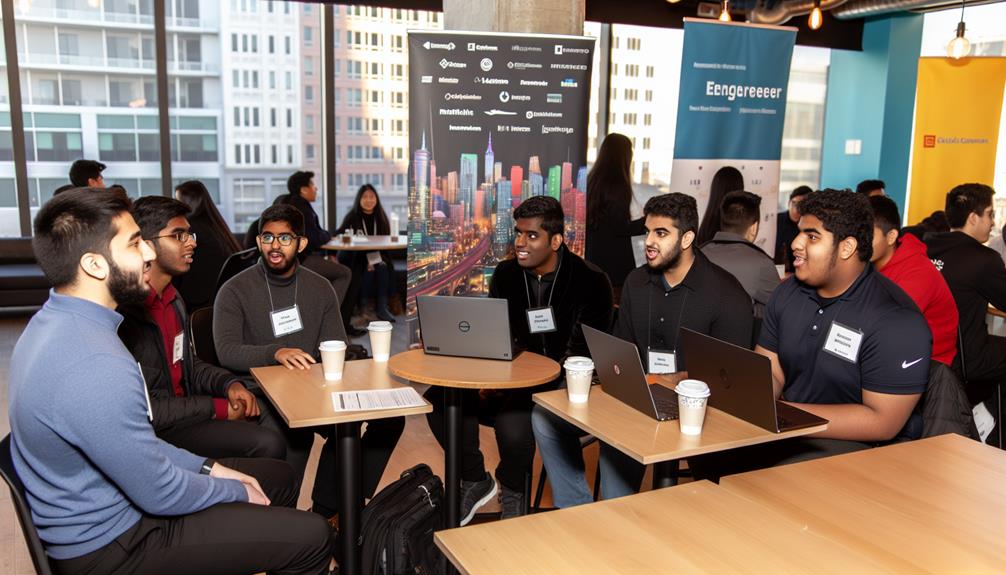How to Apply for Engineering Jobs in India
In a landscape filled with opportunities, the competition for engineering jobs in India can feel overwhelming. You need to know where to start and how to navigate this intricate job market effectively. Tailoring your approach based on the specific requirements of each role is just the beginning. As you consider your options, it’s essential to identify the key skills that employers seek. What strategies can elevate your application and put you ahead of the pack?
Key Takeaways
- Research major employers like Samsung C&T and Honda, focusing on their hiring practices and values to tailor your application.
- Enhance your resume by highlighting relevant engineering skills, internships, and using action verbs to describe your achievements.
- Utilize job portals like Naukri, Indeed, and LinkedIn to find and apply for engineering job vacancies effectively.
- Develop both technical and soft skills, emphasizing adaptability, teamwork, and communication for competitive advantage in the job market.
- Participate in job fairs and prepare for competitive exams, especially for government engineering positions, to improve your job prospects.
Understanding the Job Market
Understanding the job market is essential for your success in landing an engineering position. Currently, India boasts over 142,000 engineering jobs, showcasing a robust demand for skilled engineers across various sectors. As you navigate this landscape, it’s important to recognize that major employers include both multinational corporations, like Samsung C&T India Pvt. Ltd., and local firms or startups, all contributing to job creation.
The engineering roles available are expected to grow considerably over the next decade, particularly in renewable energy, automation, and sustainable engineering practices. However, you’ll face stiff competition in this field. Many graduates struggle to meet employer expectations due to a notable skills gap; they often lack the practical experience and specific technical skills that companies seek.
To improve your chances of securing engineering jobs, you’ll need to stay committed to continuous learning and adapt to new technologies. Focus on developing both hard and soft skills that align with industry demands. By understanding these market dynamics, you can better position yourself as a desirable candidate and enhance your prospects in the engineering job market.
Identifying Key Employers

When identifying key employers in the engineering sector, you should consider major industry players like multinational corporations and public sector companies that offer stable job prospects. Don’t overlook emerging startups, which can provide innovative opportunities and a dynamic work environment. Additionally, government job openings can be a reliable option for those seeking secure positions in various engineering fields.
Major Industry Players
A diverse array of major industry players shapes the engineering job market, offering exciting opportunities for skilled professionals. Companies like Samsung C&T India Pvt. Ltd. and Honda Motorcycle & Scooter India Pvt. Ltd. are actively seeking talented engineers, making them prime targets for your job search. Additionally, multinational corporations such as Accenture and Amazon.com are expanding their engineering teams, providing a variety of roles across multiple disciplines.
Don’t overlook public sector companies either, as government projects often require specialized engineering expertise for infrastructure development. Firms like Jacobs and Micron Technology are also competitive players, known for their strong employer ratings and commitment to workplace culture. These organizations not only offer engineer jobs but also foster an environment that values innovation and collaboration.
In this dynamic landscape, it’s essential to stay informed about these major players and their hiring trends. Tailoring your applications to match the specific needs and values of these companies can greatly enhance your chances of landing a desirable position. By focusing on these key employers, you can strategically navigate the engineering job market in India.
Emerging Startups
Emerging startups are rapidly transforming the engineering job landscape in India, creating numerous opportunities for job seekers. These innovative companies are diversifying employment options, especially for those with a degree in engineering. They focus on cutting-edge fields like technology and renewable energy, reflecting the growing demand for unique engineering solutions.
To help you navigate this dynamic landscape, consider the following key areas where startups are hiring:
- Automation: Startups are seeking System Engineers to enhance efficiency and productivity.
- Internet of Things (IoT): Engineers skilled in IoT technology are highly sought after.
- Sustainable Practices: Companies specializing in civil engineering projects prioritize eco-friendly solutions.
- Soft Skills: Adaptability and teamwork are critical in fast-paced startup environments.
- Flexible Work Models: Many startups offer remote work options and opportunities for rapid career growth.
Government Job Opportunities
Identifying key employers in the government sector can greatly enhance your job search strategy as an engineering graduate. Major organizations like Indian Railways, BHEL, and ONGC are actively hiring engineers for roles in infrastructure and energy. The government’s focus on infrastructure development means there’s a growing demand for professionals in civil, mechanical, and electrical engineering.
To tap into these opportunities, consider participating in government job fairs. These events provide an excellent platform to connect with recruiters and learn more about available positions. You’ll gain insights into application procedures, which often involve competitive exams and structured recruitment drives, helping you navigate the process effectively.
When applying, tailor your résumé to highlight relevant skills and experiences that align with the job requirements. Don’t forget to prepare for interviews—research the organization and practice common engineering interview questions. Remember, showcasing your technical expertise alongside your problem-solving abilities can set you apart from other candidates.
Stay proactive and persistent in your job search. By focusing on these key employers and following the right application procedures, you’ll increase your chances of landing a rewarding government engineering job.
Skills and Qualifications Needed

To land an engineering job, you need a solid grasp of essential technical skills tailored to your specialization, whether it’s civil, mechanical, or electrical engineering. Don’t underestimate the importance of soft skills like teamwork and effective communication, as they’re vital for successful collaboration on projects. Finally, a relevant educational background, along with practical experience, can greatly enhance your employability in this competitive field.
Essential Technical Skills
Securing a job in engineering requires a solid grasp of essential technical skills and qualifications tailored to your chosen discipline. A robust foundation in engineering principles is crucial for problem-solving and design. Here are key areas to focus on:
- Engineering certifications: Obtain relevant certifications to demonstrate your expertise in specific fields.
- Software proficiency: Master essential software tools like AutoCAD for design or Microsoft Power BI for data analysis.
- Specialization: Pursue specializations in high-demand areas such as renewable energy, mechanical, or electrical engineering.
- Technical workshops: Attend workshops to stay updated on emerging technologies and industry practices.
- Continuous learning: Embrace ongoing education to adapt to advancements in automation, AI, and other technologies.
Importance of Soft Skills
In today’s competitive engineering job market, soft skills are just as fundamental as technical expertise. Employers are increasingly valuing effective communication and teamwork skills, which facilitate collaboration in diverse projects. This shift emphasizes the importance of soft skills training alongside your technical qualifications.
Here’s a breakdown of key soft skills you should focus on:
| Soft Skill | Importance | Development Tips |
|---|---|---|
| Emotional Intelligence | Enhances workplace relationships | Practice active listening |
| Teamwork Dynamics | Critical for successful project outcomes | Engage in group projects |
| Adaptability | Essential in rapidly evolving fields | Stay updated on new tools |
| Problem-Solving | Tackles complex challenges | Work on real-world problems |
| Critical Thinking | Fosters innovation in engineering roles | Analyze case studies |
Employers seek candidates who demonstrate strong emotional intelligence, as it greatly impacts team dynamics. Being adaptable and committed to continuous learning are also important, considering the fast-paced nature of technology. By developing these soft skills, you’ll not only enhance your employability but also contribute positively to your future workplace.
Relevant Educational Background
While a strong educational background is essential for landing engineering jobs, it’s not just about having a degree. Employers look for a combination of qualifications that demonstrate your readiness for the field. Here are some key aspects to take into account:
- Engineering Degrees: Graduating from a recognized institution in fields like civil, mechanical, or electrical engineering is critical.
- Software Proficiency: Familiarity with relevant software tools and programming languages is increasingly demanded, especially in automation and IoT roles.
- Specialized Certifications: Certifications in high-demand areas like renewable energy or MEP design can greatly enhance your job prospects.
- Internships and Practical Experience: Gaining hands-on experience through internships helps bridge the gap between academic knowledge and industry requirements.
- Continuous Learning: The engineering sector evolves rapidly, so being adaptable and committed to lifelong learning is essential.
Navigating Job Vacancies

As you explore the vast landscape of engineering job vacancies, understanding where to look can greatly enhance your chances of finding the right opportunity. With over 142,000 engineering jobs available in India, it’s crucial to adopt effective job search strategies. Focus on sectors like technology, manufacturing, and renewable energy, where demand for specialized skills is on the rise.
Utilize job portals and networking platforms to stay updated on the latest vacancies. Major employers, such as Samsung C&T India and Honda Motorcycle & Scooter, actively seek candidates, particularly in states like Karnataka and Maharashtra. Don’t overlook remote work options, which are expanding rapidly.
When applying, tailor your application materials to each role. Highlight your relevant skills and experience to stand out. Additionally, prepare thoroughly for interviews by researching the company and practicing common engineering-related questions. This preparation will not only boost your confidence but also demonstrate your commitment to the position.
Crafting an Effective Resume

Finding job vacancies is just the first step; presenting yourself effectively through your resume can make all the difference in securing an engineering position. To craft an effective resume, focus on key aspects that catch the attention of recruiters. Here are some resume formatting tips to keep in mind:
- Tailor your resume to highlight relevant engineering skills and experiences.
- Use action verb usage to describe your contributions, making your achievements more impactful.
- Incorporate keywords from the job description to guarantee alignment with the employer’s needs.
- Emphasize any internships or practical experiences to showcase hands-on exposure.
- Keep your resume concise, ideally within one page, to capture attention quickly.
Utilizing Job Portals Effectively

To effectively navigate the job market, utilizing job portals can greatly enhance your chances of landing an engineering position. Start by leveraging popular platforms like Naukri, Indeed, and LinkedIn, which host over 142,000 engineering job listings in India. To maximize your visibility, focus on job portal optimization by creating a detailed profile that highlights your engineering degree, relevant experience, and key skills. Extensive profiles attract recruiters more effectively.
Utilize filters on these portals to narrow your search by location, experience level, and specific engineering disciplines, such as civil, mechanical, or electrical. This approach makes it easier to find suitable opportunities tailored to your expertise. Setting up job alerts is another smart strategy; you’ll receive notifications for new postings that match your preferences, ensuring you don’t miss out on timely application opportunities.
Additionally, remember to regularly update your resume and cover letter to reflect your latest skills and projects. Job portals often allow you to apply directly through their systems, making application tracking more straightforward and increasing your chances of connecting with potential employers. By following these steps, you’ll enhance your job search greatly.
Networking Strategies for Success

Networking is an essential strategy for success in landing engineering jobs, and there are several effective ways to build and expand your professional connections. Start by leveraging platforms like LinkedIn to connect with industry professionals and join engineering groups, as there are currently over 142,000 engineering jobs available in India.
Consider these strategies for effective networking:
- Attend networking events: Engage with key employers at industry-specific conferences and seminars to gain insights and job leads.
- Join mentorship programs: Find mentors who can provide guidance and open doors to new opportunities.
- Participate in online workshops: Enhance your skills and meet like-minded professionals in virtual settings.
- Utilize alumni networks: Tap into connections from your engineering institution for job referrals and insider information.
- Volunteer for projects or internships: Gain hands-on experience while expanding your network and showcasing your skills to potential employers.
Preparing for Interviews

A successful interview can be your gateway to landing the engineering job you’ve been dreaming of. Start by researching the company and its engineering projects to showcase your knowledge and genuine interest. Employers like Samsung C&T and Honda value candidates who align with their goals.
Next, practice common engineering interview questions that focus on your technical skills and problem-solving abilities, especially in fields like renewable energy and automation. Highlight any internships or hands-on experiences, as these demonstrate your practical understanding of engineering principles.
When it comes to interview attire, dress professionally to make a positive first impression. Your body language plays an essential role, too; maintain eye contact, offer a firm handshake, and sit up straight to convey confidence and engagement.
Prepare to discuss your proficiency in relevant software tools, like AutoCAD or programming languages, as these are often key requirements. Additionally, be ready to provide examples of your communication and teamwork skills, as employers increasingly prioritize soft skills.
Frequently Asked Questions
How Can I Get a Job as an Engineer in India?
“Where there’s a will, there’s a way.” To land an engineering job in India, focus on strong resume building tips that highlight your skills. Don’t underestimate interview preparation strategies; practice common questions and showcase your experiences. Seek networking opportunities by attending industry events or connecting with professionals online. These steps will increase your chances of standing out and securing a position in the competitive engineering landscape. Stay persistent and proactive!
How Can I Join Engineering in India?
To join engineering in India, you’ll need to clear engineering entrance exams, which are essential for admission into top engineering colleges. Research various engineering career paths to find what suits you best. Focus on your strengths and interests, and prepare thoroughly for these exams. Once you’re in college, engage in internships and projects to gain practical experience, as this will greatly enhance your understanding and employability in the engineering field.
Can I Get Engineering Job in USA From India?
You’d think landing an engineering job in the U.S. from India is a breeze, right? Well, it’s not that simple! You’ll need to navigate visa requirements, like securing an H-1B sponsorship. Start your job search by focusing on engineering specialties that are in demand. Networking on platforms like LinkedIn and showcasing your skills can enhance your chances. Remember, practical experience is a game-changer, so consider internships in the U.S. for an edge!
Are Engineering Jobs in Demand in India?
Yes, engineering jobs are in high demand in India. You’ll notice strong engineering job trends driven by industry growth, particularly in renewable energy and technology sectors. Companies are actively seeking professionals with specialized skills in civil, mechanical, and electrical engineering, along with expertise in emerging fields like AI and IoT. Staying updated on these skills can enhance your employability and position you well in this competitive job market.
Conclusion
In the journey to land your engineering job in India, think of yourself as a skilled navigator charting a course through a vast sea of opportunities. By understanding the market, honing your skills, and making meaningful connections, you can steer your ship toward success. Remember, each application and interview is a step closer to your destination. Embrace the challenges, stay committed to learning, and soon, you’ll find yourself thriving in your chosen field.
